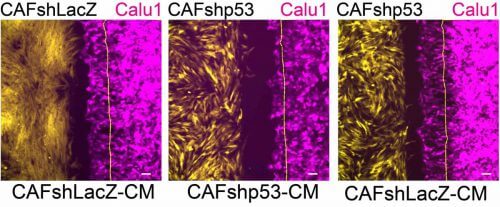Weizmann Institute of Science scientists showed that silencing the p53 gene in cancer-supporting fibroblasts caused them to lose the properties that help cancer spread

Rare are the cases where a senior commander defected to the enemy during a military campaign. However, the body's fight against cancer has its own rules: when a cancerous tumor develops, it may cause the "betrayal" of the gene called p53, which plays a central role in protecting the body. as which was recently reported in the scientific journal "Proceedings of the American Academy of Sciences" (PNAS), scientists at the Weizmann Institute of Science discovered that the betrayal of this gene can manifest itself in more ways than previously thought.
p53 is found in every cell in the body, and usually contributes a lot to the prevention of cancer: it supervises various defense mechanisms of the cell, and if these fail, sometimes it even kills the cell. In about half of cancer patients, the p53 gene found in the cancer cells contains genetic errors (mutations), which cause the creation of a protein that not only does not suppress the cancer, but also allows it to spread further.
Besides cancerous cells, the malignant tumor also contains various non-cancerous cells, and these are collectively called the "tumor microenvironment". In the initial stages of cancer development, the microenvironment is hostile to the malignant tumor. Prof. Moshe Oren from the department of molecular biology of the cell and other scientists found in previous studies that the protein that produces p53 in the cells of the microenvironment contributes to this hostility, and tries to stop the cancer. "Probably the defensive effort is mostly successful, otherwise people would get cancer with a much greater frequency than is known today," says Prof. Oren.
However, as the cancer progresses and becomes more malignant, the microenvironment gradually changes. The scientists call this process "education": the developing tumor mobilizes the microenvironment in its favor, and instead of stopping the cancer, it transforms its skin and allows the cancer to spread even more. Among other things, the fibroblast cells are recruited for this purpose, which provide the "glue" that stabilizes the tissue structure. The scientists call these recruited cells "cancer-supporting fibroblasts": instead of calling for the help of the immune system to stop the cancer, they begin to secrete substances that encourage the tumor's growth and survival.
The new research carried out in Prof. Oren's laboratory, in collaboration with other scientists at the institute, showed that the "education" of the microenvironment "spoils", among other things, also p53. When the cancer progresses, the fibroblast protein "conveys" to the ranks of the malignant enemy. Admittedly, it does not carry mutations - unlike what happens in the cancer cells themselves - but its character nevertheless changes so that it stops stopping the cancer and starts helping its spread.
In the study, led by the post-doctoral researcher Dr. Shaarat Chandra Arendkar, in collaboration with Prof. Binyamin Giger from the same department and Prof. Yosef Yordan and Dr. Igor Olitsky from the Department of Biological Control, the scientists showed that the silencing of the p53 gene in cancer-supporting fibroblasts, and as a result, the absence of the protein p53, caused these cells to lose their cancer-promoting properties, and behave like normal fibroblasts. Also, the silencing of p53 in fibroblasts reduced the migration of nearby cancer cells - a change of crucial importance, because invasive migration contributes to the spread of cancer metastases in the body. In addition, silencing p53 in cancer-promoting fibroblasts significantly reduced the ability of these cells to aid cancer development in mice.
Also participating in the study were Dr. Noa Pirat, Dr. Yair Elisha and Dr. Nishant Blogeti Netraj from the Weizmann Institute, and Prof. Walter Olitsky and the late Dr. Heiko van der Koep, to whose memory the article is dedicated, from the Institute of Clinical Pharmacology named after Dr. Margaretha Fischer-Busch in Stuttgart, Germany.
Searching for ways to "re-educate" the treacherous p53 in the cells of the tumor microenvironment - that is, to make it go back to suppressing the cancer - may lead to the development of treatments that target the microenvironment instead of the cancer cells themselves. In recent years, efforts have increased to develop therapeutic approaches focused on what is happening in the microenvironment. Since the microenvironment evolves more slowly than the tumor infected with the mutations, the researchers hope that these approaches will open a new window of opportunity for effective treatments.
More of the topic in Hayadan:

2 תגובות
To my father Blizovsky
For some reason it is not possible to send comments to the article with the semitron - dark energy.
I'd love it if you check it out.
Thanks
In my opinion, the new approach of harming the cancer environment can be suitable for many types of cancer and it can at least be an inhibiting step in the development of the tumor.
Yehuda